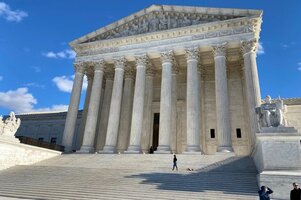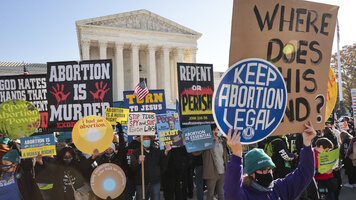PPEcel
cope and seethe
★★★★★
- Joined
- Oct 1, 2018
- Posts
- 29,087

In the 2021-22 term, the U.S. Supreme Court heard a total of 66 cases. 57 of them have been decided. It's certainly been an exciting term so far—but there's still more to come!
Tomorrow, on Friday June 24th, the Court will release one or more decisions at ten-minute intervals starting at 10 am ET. Here's my rundown of the nine remaining cases, ordered by date argued.
Update (Saturday, June 25th): The U.S. Supreme Court has decided Becerra and Dobbs. An additional decision day is scheduled for Monday, June 27th, where one or more of the remaining seven cases will be decided.
Update (Monday, June 27th): The U.S. Supreme Court has decided Concepcion, Ruan, and Kennedy. An additional decision day is scheduled for Wednesday, June 29th, where one or more of the remaining four cases will be decided.
Update (Wednesday, June 29th): The U.S. Supreme Court has decided Torres and Oklahoma. The remaining two cases will be decided at 10 am ET tomorrow (Thursday, June 30th). At noon, Justice Stephen Breyer will retire and Ketanji Brown Jackson will be sworn in as the 104th Associate Justice of the Supreme Court.
1. Becerra v. Empire Health Foundation
Oral argument: Nov 29th, 2021
Lower court: U.S. Court of Appeals, Ninth Circuit
The U.S. Supreme Court will consider whether the Department of Health and Human Services (HHS) properly interpreted the Medicare Act and the Administrative Procedure Act in promulgating an administrative rule in 2005—amending 42 C.F.R. § 412.106(b)(2)—which changed how HHS calculates its reimbursement rates to hospitals serving low-income areas.
DECISION: On Friday, June 24th, the Court ruled in favor of HHS in a highly technical 5-4 decision. Justice Kagan, joined by Thomas, Breyer, Sotomayor, and Barrett upheld the administrative rule.
2. Dobbs v. Jackson Women’s Health Organization
Oral argument: Dec 1st, 2021
Lower court: U.S. Court of Appeals, Fifth Circuit

Mississippi passed a law—the Gestational Age Act—banning virtually all abortions after 15 weeks of pregnancy. Jackson Women's Health Organization, the only abortion clinic remaining in the state, filed suit to enjoin its enforcement. The U.S. Supreme Court will decide if the Mississippi law can stand, and whether to uphold or overturn prior decisions holding that abortion is a protected liberty interest under the Due Process Clause of the Fourteenth Amendment.
DECISION: On Friday, June 24th, the Court officially upheld the Mississippi law in a 6-3 decision. Justice Alito, joined by Thomas, Gorsuch, Kavanaugh, and Barrett, held that the Constitution does not confer a right to abortion, overturning Roe and Casey. Chief Justice Roberts filed an opinion concurring in the judgment. Justices Breyer, Sotomayor, and Kagan filed a dissenting opinion.
3. Concepcion v. United States
Oral argument: Jan 19th, 2022
Lower court: U.S. Court of Appeals, First Circuit
Carlos Concepcion was sentenced in 2009 to 19 years in federal prison on crack cocaine charges. In 2018, Congress enacted the First Step Act, which retroactively reduced statutory penalties for many drug crimes in line with the Fair Sentencing Act of 2010. Concepcion moved for resentencing, but the district court denied his motion. The U.S. Supreme Court will now resolve a circuit split as to whether federal district courts are allowed to, or even obligated to, consider legal developments and/or other post-sentencing factors in re-sentencing a criminal defendant.
DECISION: On Monday, June 27th, the Court ruled in favor of Concepcion in an ideologically scrambled 5-4 decision. Justice Sotomayor, joined by Thomas, Breyer, Kagan, and Gorsuch, held that the Constitution confers upon federal judges the discretion to consider both legal and factual post-sentencing developments in re-sentencing criminal defendants.
4. West Virginia v. Environmental Protection Agency
Oral argument: Feb 28th, 2022
Lower court: U.S. Court of Appeals, District of Columbia Circuit

In 2015, the Obama administration enacted the Clean Power Plan. The EPA, relying on an ancillary statute of the Clean Air Act—42 U.S.C. § 7411(d)—issued administrative rules broadly regulating and limiting carbon emissions from power plants. The Trump administration withdrew the Clean Power Plan in 2017, but the Obama-era rules were reinstated after the appeals court held that the Trump administration violated the Administrative Procedure Act in doing so. Soon after, West Virginia and several corporations filed suit challenging the EPA's authority to issue the rules in the first place. The U.S. Supreme Court will now determine the extent to which the EPA can broadly regulate carbon emissions.
DECISION: On Thursday, 30th June, the Supreme Court sided 6-3 with West Virginia and the North American Coal Corporation and held that the EPA exceeded its authority under the Clean Air Act in devising the Clean Power Plan. Roberts, joined by Thomas, Alito, Gorsuch, Kavanaugh, and Barrett, held that the major questions doctrine preempts the EPA's interpretation of the statute. Kagan, joined by Breyer and Sotomayor, dissented.
5. Ruan v. United States
Oral argument: Mar 1st, 2022
Lower court: U.S. Court of Appeals, Eleventh Circuit
An Asian-American doctor in Mobile, Alabama, Xiulu Ruan was convicted on federal drug trafficking and racketeering charges after he allegedly prescribed opioids outside the professional standard of care. Other doctors have faced similar charges. The U.S. Supreme Court will now resolve a circuit split and determine whether 21 U.S.C. § 841(a)(1) allows for their convictions to stand without regard to whether they had a good faith "reasonable belief" or "subjective intent" that their prescriptions were within the professional standard of care.
DECISION: On Monday, June 27th, the Court ruled 9-0 in favor of Xiulu Ruan and reversed the Eleventh Circuit. Justice Breyer, joined by Roberts, Sotomayor, Kagan, Gorsuch, and Kavanaugh, held that 21 U.S.C. § 841(a)(1) requires the government to prove that a defendant committed drug trafficking "knowingly and intentionally". Lower standards of mens rea are not applicable. Justice Alito, joined by Thomas, and joined partly by Barrett, concurred in the judgment but disagreed with the majority's statutory interpretation of § 841.
6. Torres v. Texas Department of Public Safety
Oral argument: Mar 29th, 2022
Lower court: Texas Court of Appeals, Thirteenth Judicial Circuit
A state trooper employed by the Department of Public Safety (DPS), Leroy Torres was deployed to Iraq in 2007 as part of the U.S. Army Reserve. While in Iraq, Torres acquired a medical condition and, after his return to Texas, requested employment with DPS in a different position. DPS declined. Torres sued the DPS under the Uniformed Services Employment and Reemployment Rights Act (USERRA), a federal law prohibiting employment discrimination against prior servicemembers. The U.S. Supreme Court will now decide whether sovereign immunity bars the federal government from authorizing civil claims against nonconsenting states, and whether congressional war powers permit the abrogation of such immunity.
DECISION: On Wednesday, June 29th, the Court ruled 5-4 in favor of Torres. Justice Breyer, joined by Roberts, Sotomayor, Kagan, and Kavanaugh, held that congressional war powers abrogate intergovernmental immunity, allowing Torres' lawsuit against the Texas Department of Public Safety to proceed.
7. Kennedy v. Bremerton School District
Oral argument: Apr 25th, 2022
Lower court: U.S. Court of Appeals, Ninth Circuit

Joseph Kennedy was an assistant football coach at Bremerton High School near Seattle. After each game, Kennedy would visibly engage in prayer near the 50-yard line. Fearful that they would be found liable for violating the Establishment Clause of the First Amendment, district officials terminated Kennedy's employment after he declined to stop praying and would not accept an accommodation to pray in a private room. The U.S. Supreme Court will now decide if the school violated the Free Speech and Free Exercise Clauses of the First Amendment in terminating Kennedy.
DECISION: On Monday, June 27th, the Court ruled 6-3 in favor of Kennedy. Justice Gorsuch, joined by Roberts, Thomas, Alito, Barrett, and joined partly by Kavanaugh, held that Kennedy's prayer was protected by both the Free Speech and Free Exercise Clause of the First Amendment. In doing so, the Court explicitly overruled Lemon v. Kurtzman, 403 U.S. 602 (1971), holding that Establishment Clause violations should be interpreted with "reference to historical practices and understandings". Justice Sotomayor, joined by Breyer and Kagan, filed a dissenting opinion.
8. Biden v. Texas
Oral argument: Apr 26th, 2022
Lower Court: U.S. Court of Appeals, Fifth Circuit

In 2018, the Trump administration introduced the Migrant Protection Protocols (MPP), also known as the "remain-in-Mexico policy", requiring some asylum seekers seeking entry to the U.S. via the Southern border to remain in Mexico whilst their claims were processed. The Biden administration attempted to end the policy in 2021, but Texas filed suit, arguing that the Biden administration's policy change violated 8 U.S.C. § 1225 and the Administrative Procedure Act. The U.S. Supreme Court will now decide whether the Biden administration must continue to enforce the MPP.
DECISION: On Thursday, June 30th, the Court ruled against Texas and allowed the Biden administration to terminate the Trump-era MPP. In a 5-4 decision, Roberts, joined by Breyer, Sotomayor, Kagan, and Kavanaugh, wrote that § 1225 gives the executive branch discretion to decide whether migrants seeking asylum at a land-based port of entry are required to remain outside of the United States while their claims are processed.
9. Oklahoma v. Castro-Huerta
Oral argument: Apr 27th, 2022
Lower Court: Oklahoma Court of Criminal Appeals
A non-Native man, Victor Manuel Castro-Huerta was convicted and sentenced to 35 years in state prison for neglecting his stepdaughter, a Native American living on the Cherokee Reservation. In 2020, the U.S. Supreme Court decided in McGirt v. Oklahoma that under the federal Major Crimes Act, state governments do not have the authority to prosecute crimes committed on certain Native American land without the approval of the federal government. Oklahoma argues that it has the authority to prosecute Castro-Huerta as he is a non-Native man. The U.S. Supreme Court will now refine the scope of McGirt.
DECISION: On Wednesday, June 29th, the Court ruled 5-4 in favor of Oklahoma. Justice Kavanaugh, joined by Roberts, Thomas, Alito, and Barrett, held that under current statute, state governments can prosecute crimes committed by non-Natives on Native American land without the consent of the federal government. Justice Gorsuch, joined by Breyer, Sotomayor, and Kagan, dissented.
@sub human @Wizard32 @RoastieBeef @METALMILITA88 @Mulattocel @Ducky @Saint Cho @faded @PoodankMcGee @CrackingYs @Transcended Trucel
Last edited:





